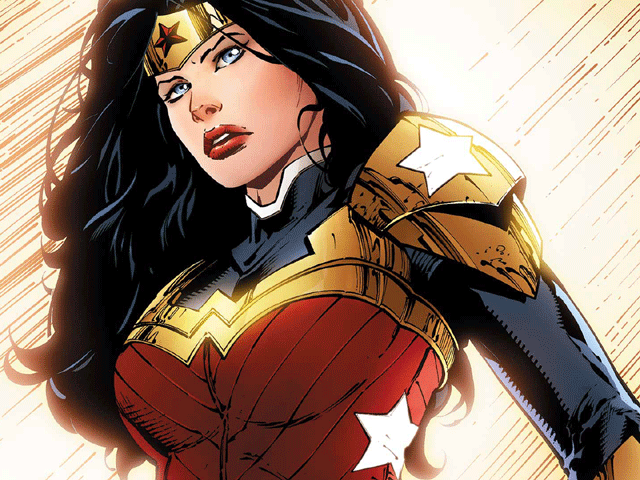Why Wonder Woman is fit for the title UN Honorary Ambassador
The comic superhero will be officially appointed UN's new Honorary Ambassador for the Empowerment of Woman and Girls

Wonderwoman. PHOTO: DC COMICS
Seventy-five years after the character's debut, the comic superhero will be officially appointed United Nation’s new Honorary Ambassador for the Empowerment of Woman and Girls, kicking off a brand new campaign for gender equality, on October 21. Fans rejoice, but criticism is not completely absent for the designation being awarded to a fictional heroine, rather than one of the running choices of living female personalities, whom people opine would make for more inspiring figures.
Wana Bazaar’s wonder woman defies gender norms
The claim stands as a tempting argument to buy into. But the unapologetic radicalism of the creation was no coincidence and hence, can neither be overlooked nor understated. Marston himself called it a “psychological propaganda for the new type of woman who should, I believe, rule the world” as Elizabeth and he continued to support and draw inspiration from early feminists such as Margaret Sanger. In a story titled ‘Battle for Womanhood’ that came out two years after its launch, the heroine Diana Prince, tells women to “Earn [their] own living (…) and fight for [their] country!” only to later report to Hippolyte, her mother, that “women are gaining power in the man’s world!” Although they were also times of heavy advocacy for birth control, as Marston wrote feminism had lost much of its traction after the Suffragette Movement. And yet, here was a comic book character making bold political statements, going as far as to urge women to “join the WAACS [Women's Army Auxiliary Corps].”
This was far from the apolitical attitude expected of a comic character, much less a female, in times when women had never been considered worthy of being cast as superheroes. And yet, the creators succeeded in subtly but effectively shaping the character with a believable roundedness that lent it conviction. Wonder Woman was through and through a brave warrior, a compassionate friend, and a just ambassador. She was ridden with as much character and authenticity as any of the six other male Justice League members, and as fit for the team.
Women empowerment: ‘Pakistan working for gender equality’
The cultural impact, thus, can be said to be double-fold. Importantly and visibly, Wonder Woman served the arguably unwitting pilot for proceeding female superheroes, including the likes of Black Widow and Batgirl. In this, the character undoubtedly led towards more balanced gender representation in comics. And secondly, Wonder Woman laid the tone and created space, viewership and expectation for female characters to be cast with more deliberation and thought, as she herself went on to break stereotypes pervasive at the time, such as those of “damsels in distress” and maidens expecting chivalry. Throughout the decades, she is also shown coming face-to-face with, and triumphing over classic villains from Cheetah to Doctor Psycho.
Other than that, contemporary readings of the comics note how Themyscira, the Amazonian society to which Diana belongs, remains a proto-lesbian community that houses only women. Hence, leading to the logical conclusion of homosexuality being the norm, an interpretation confirmed by Greg Rucka, writer of the Rebirth series. Where character representation of the LGBTQPIA community is still met with hostility today, this comes as a stunning statement to have been made three quarters of a century ago. To add, Diana refuses to quit for the sake of Steve Trevor, her love interest, as the writers believe that would “diminish her heroism”.
After much criticism hurled at DC Extended Universe (DCEU) for sidelining and underrepresentation of the heroine onscreen, especially following Batman vs. Superman: Dawn of Justice, the movie Wonder Woman, starring Gal Gadot, is due to be released in July 2017. Jill Lepore, historian and author of The Secret History of Wonder Woman explains the reason for the delay to be, “Wonder Woman is so hard to put on film because the fight for women’s rights has gone so badly."
For the record: ‘Wonder Woman’ director hits back
Although it is not her first instance of international recognition – she appeared on the cover of the first issue of Ms., an American liberal feminist magazine co-founded by activist Gloria Steinem, and was named a “symbol of feminist revolt”, both in 1972 – acknowledgement of the significance of the iconic Amazon Princess remains justified. If for nothing else, then for pioneering the legacy of comics, such as Alison Bechdel’s, which revolve around empowered, inspiring women as they explore the fluidity, constructs and joys of gender and sexuality, and open dialogue for feminism.
Arfa Ezazi is an English Literature major and co-editor of the bilingual literary magazine, Zau.



















COMMENTS
Comments are moderated and generally will be posted if they are on-topic and not abusive.
For more information, please see our Comments FAQ